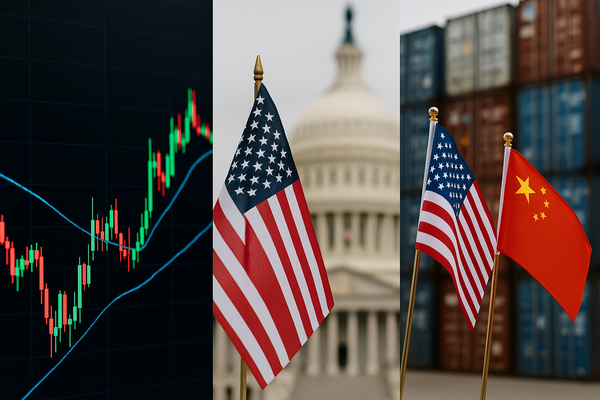
Stocks slipped after a sudden rotation out of highflying technology and chip names, while surprise Democratic wins and a thaw in U.S.-China trade measures added fresh drivers. In the short term, investors will watch earnings reactions, ADP payrolls and Supreme Court tariff hearings for clarity. Over the long term, valuation strain in AI-linked names could reset sector returns and policy moves between Washington and Beijing could reshape trade flows. The story matters globally as Asian tech markets and European equities felt the sell pressure, while U.S. bond yields, the dollar and local politics will shape domestic investor positioning.
Market snapshot
Quick take on what moved markets overnight
U.S. benchmarks fell after a rare shakeout in Big Tech and semiconductor stocks. The S&P 500 and the Nasdaq lost more than 1 percent on the session that prompted selling in Asia and Europe. Futures showed no immediate rebound heading into the next trading day.
Tech names that had run hard this year were hit the hardest. Palantir (NYSE:PLTR) slumped after an earnings stumble. Advanced Micro Devices (NASDAQ:AMD) slipped in after-hours trade despite results that many viewed as decent. Super Micro Computer (NASDAQ:SMCI) plunged on profit and revenue misses.
Investor nervousness was amplified by headline risks. A surprising group of Democratic victories in local races in New York and at the state level injected political uncertainty. At the same time China confirmed it will suspend some retaliatory tariffs on U.S. goods following recent leader-level talks, while keeping a 13 percent duty on soybeans.
Tech correction and earnings heat
Valuation pressure, big names and what to watch next
High valuations in AI and chip stocks weighed on sentiment. Some investors questioned whether a more prolonged drawdown is possible after months of outsized gains across the sector. The swing in sentiment was not driven by one clear catalyst. Rather it reflected mounting unease about sky-high multiples and the fragile footing of momentum trades.
Palantir (NYSE:PLTR) has become a focal point after an earnings misstep. The company is an example of how fast-moving AI enthusiasm can translate into sharp share moves. Advanced Micro Devices (NASDAQ:AMD) reported results that many judged adequate, yet the stock fell on profit-taking. Super Micro Computer (NASDAQ:SMCI) delivered a clearer miss and saw a bigger decline.
Investor attention will center on several large earnings events later in the session. Qualcomm (NASDAQ:QCOM) headlines the corporate calendar and Costco (NASDAQ:COST) will provide a retail read. How these companies react to guidance and demand commentary will matter for risk appetite into the rest of the week.
Politics, court hearings and policy risks
Local election surprises collide with national policy processes
Voters delivered a surprisingly positive result for Democrats in several local contests. The election of Zohran Mamdani as New York City mayor and other Democratic wins gave the party a jolt ahead of next year’s congressional campaign. Markets are assessing what that means for city competitiveness and municipal policy aimed at business and finance.
At the national level the Supreme Court began hearings on the legality of key presidential tariff actions. The rulings under consideration could influence trade policy frameworks and the scope of future tariff use. That legal process is likely to weigh on market thinking about trade certainty and corporate planning.
Macro calendar and data signals
Payrolls, services data and the lingering budget standoff
The economic calendar adds more near-term catalysts for markets. ADP private payrolls will give a view of private sector hiring ahead of official government data. The ISM services survey will offer a snapshot of service-sector momentum in October.
Federal Reserve officials remain divided on the path for policy. That disagreement surfaced in commentary noting foggy economic signals. Market participants will parse data releases and Fed speeches for clues on when the central bank might change its stance. U.S. Treasury yields recovered some overnight losses ahead of these releases, and that will shape rate-sensitive sectors.
Meanwhile the U.S. is dealing with the longest government shutdown on record. Tentative talks to end the impasse showed no breakthrough. The shutdown creates irregular data flows and adds uncertainty for fiscal planning.
Global spillovers, currencies and risk assets
How Asia and Europe reacted and the currency story to watch
Asian markets showed the ripple effects of U.S. tech slippage. Japan and South Korea saw tech-heavy indexes fall more than 2 percent each. China’s equities outperformed after Beijing issued guidance that state-funded data center projects must use domestically-made AI chips. That move supports China’s push for onshore tech supply chains and could alter demand patterns for global chip makers.
The dollar strengthened, reaching its best level since May. The Korean won hit a seven month low as the KOSPI posted its worst session since early August. Bitcoin also fell sharply and briefly dipped under the psychologically significant 100,000 level before struggling to regain ground.
Sterling recovered some losses after U.K. finance policy signals hinted at possible tax adjustments. The euro lagged even as European business surveys showed the fastest expansion of the region’s economy in over two years. Markets will weigh central bank commentaries from the Bank of Canada and the Bank of England this week for hints on policy timing.
What to watch in the coming session includes corporate earnings responses from major tech and retail names, ADP payrolls and the ISM service sector release. Markets will also screen the Supreme Court tariffs hearing and any updates on the U.S.-China tariff thaw for immediate directional cues. Traders will be balancing near-term volatility against longer term questions about tech valuations and policy-driven trade flows.












